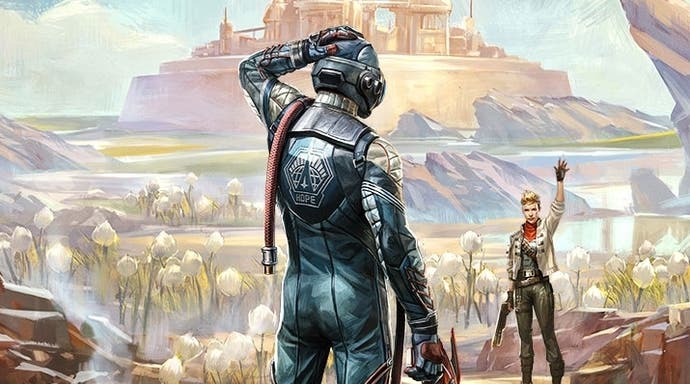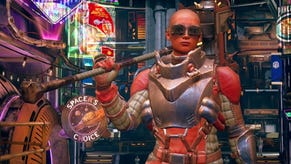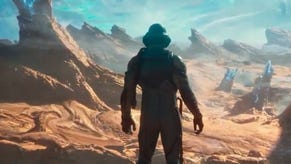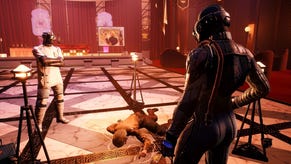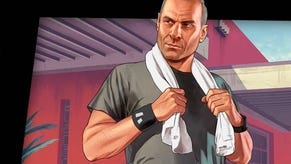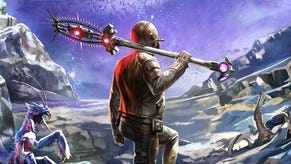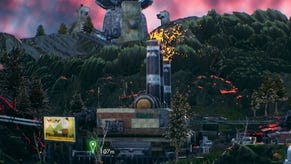The Outer Worlds review - RPG comfort food that never stretches the imagination
Corp speed.
The solar system of Obsidian's The Outer Worlds is swimming with comically evil corporate products: toothpaste that causes blindness, hangover cures that induce comas, each with its jaunty advertising catchphrase and baleful barbershop jingle. Compared to that trove of terrors, the corporate product that is The Outer Worlds itself is kind of like a posh cup-a-soup. It's far from haute cuisine, or especially nutritious - the packaging probably accounts for a solid 30 per cent of the calories - but it goes down easily enough and it won't do you any damage. It's fine, is Outer Worlds. There's nothing I really loathe about it, the tedium of looting aside, and nothing I really love about it either. If you read the sales pitch "Maker of Fallout: New Vegas makes Fallout-tinted cover version of Mass Effect" and broke your thumb on the pre-order button, rest assured that this is broadly that. But what else could it have been?
The game begins eccentrically enough. The Outer Worlds unfolds in an alternate universe where the USA never passed some critical anti-trust legislation, and humanity is accordingly owned and operated by vast corporations. Your custom-created character is a pioneer aboard the interstellar colony ship Hope, cast out toward the Halcyon system by the all-knowing hand of Profit Motive. Said hand then declines to revive you when the Hope turfs up, decades late, due to a drive malfunction. The system, you learn, has already been settled in your absence and transformed into a fungal, retro-futuristic Wild West, its planets dotted with flat-packed, hardscrabble townships of chrome and timber. It's a place of on-going resource wars and caricatured ideological tensions, with quasi-communist "Philosophist" rebels embedded on one moon and a trio of big companies tussling for preeminence. The last thing your employers need is another few hundred mouths to feed, particularly if those colonists then fall in with the lefties.
Fortunately, you are sprung from cryosleep by motor-mouthed mad scientist (is there any other kind?) Dr Phineas Wells, who sends you on a quest to unfreeze the remainder of your crew. Among your first feats is to land an escape pod squarely on top of the mercenary captain Phineas has asked to be your chaperone. This frees you from oversight, while also giving you the keys to the mercenary's ship, the Unreliable, a cousin of Mass Effect's Normandy made entirely from trashcans and spit. This serves as your mobile homestead - complete with sarky AI landlord - as you explore Halcyon, undertaking main and optional quests, picking allegiances, unearthing ulterior motives and recruiting six companions to your cause. The two major planets consist of lavish open worlds with several landing sites. You'll spend the bulk of the game here, but there are also smaller areas such as asteroid hideaways, makeshift space bazaars, scorched mining facilities and prisons. Many landing sites must be unlocked by obtaining a pass, which turns The Outer Worlds into an interstellar game of Find the Keycard. You'll obtain these cards as part of the main story, which should last you 20-30 hours if you take your time.
I had reasonably high expectations for The Outer Worlds' satire, after spending an hour with it this summer. These expectations were not met, though the writing has its moments. The premise is satisfyingly unceremonious, next to most other RPGs. It introduces you as spare goods, plucked at random from the left luggage locker, and endows you not with the usual Chosen One CV but a selection of blue-collar backstories such as bartender and factory loader. This puts you on the same footing as many of the colonists you'll meet, half of them contractually obliged to speak in advertising slogans; one conversation tree sees you pestering a miserable shopkeeper to say something, anything that's not in his script.
There are some decent gags and moderately engrossing scenarios in play. Hackable terminals in the many gutted factories, outposts and laboratories you'll visit are full of emails about workplace abuses, blithe missives from HR, and passive-aggressive spats with coworkers. On one planet, there's a reformist rogue executive who speaks in self-care mantras; his nemesis, the daydreaming socialist across the valley, is a frustrated copywriter (I see you too, Obsidian).
Sadly, though, the satire is more often cute than cutting. The game tries sporadically to explore the question of a corporate-run dystopia in earnest, typically by asking you to weigh the mutually exclusive claims of two factions, capitalist and anti-capitalist. But much of the time, the portrayal is too reliant on clichés sucked dry by Fallout and Bioshock. The bosses are invariably slick, silver-tongued and content to wallow in hypocrisy. The 50s-style ads that cover walls and loading screens are macabre in a predictable, adolescent way (each has its cheeky disclaimer detailing a range of horrible side effects). The people slaving under the corporate yoke are all folksy, can-do sorts who shave the grammatical subject from every sentence because dang it, there's no time for "I" when you're wearing your fingers to the bone on behalf of Johnny CEO. Most importantly, none of it makes much of an impact on your tools and tactics as player, beyond that eye-catching beginning. You could swap The Outer Worlds' social commentary elements for the peaks of Skyrim or Mordor and it would be exactly the same game, which is to say, one you've played many times before.
There are a dozen or so skills to level up, with more specialised perks - such as a chance of resetting a companion's ability cooldown - to unlock every other level. You can mod your weapons and armour at worktables for tweaks like quieter footstep noise, and chug down a sizeable range of narcotics for a short-lived stat boost (and subsequent withdrawal symptoms). There are lots of variables, but it all boils down to four, millennia-old ways of role-playing: shooting, hacking, sneaking and talking people round to avoid conflict entirely. Generally, you'll make use of all of these approaches simultaneously, much as you might strive to define yourself as, say, a glib gunslinger or a brainiac with a tournament-class right hook.
There's a slight claustrophobia to The Outer Worlds, for all its searing skyboxes and neon-striped roads winding in amongst hills of alien flora. There are too many ways of beating each quest per square metre. You'll discover key props or half-complete undiscovered quests in passing, and the different routes and means of reaching each waypoint are seldom far apart. You rarely have to really think about what you're doing, or exercise much curiosity about either the environments or the people that live within them - everything just sort of falls into place under your feet.
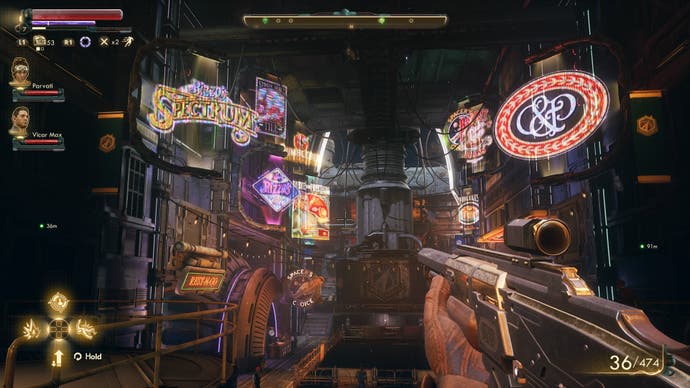
Mind you, you'll be doing plenty of poking around. The Outer Worlds isn't quite as obsessed with loot as Fallout under Bethesda, not least because it doesn't support full object physics, but its landscapes brim nonetheless with containers and bricabrac. Even the homeliest shack in the wilderness is strewn with foodstuffs, weapon mods, equipment, ammo, drugs and sellable junk. You know that you need to sponge up some of the loot - much of it frustratingly tucked in amongst objects you don't want - to keep pace with the difficulty curve, but it's unclear what will prove essential down the line. So you end up gathering absolutely everything, till you hit your character's weight limit and dismantle/eat 50 per cent of your haul in frustration. The gunplay, at least, is smart and stylish enough to puncture the mounting boredom, thanks in no small part to a totally-not-VATS-inspired time-slowing ability that highlights the effects of targeting different body parts. The arsenal is a no-frills stew of pistols, rifles, heavy weapons and melee tools, but you'll need to match ammo types such as plasma or lightning to target vulnerabilities, which takes a bit of planning. It's never Bulletstorm, but it's a cut above mindless mayhem.
Much of my apathy for The Outer Worlds' conventions is a question of taste, of course, and there are plenty of RPGs that do the same things worse. But all the same, do we really need another one of these? So much of this game feels like a formula on repeat, for all the charisma of its landscapes, which include some towering fields of Morrowindy mushrooms. Take companions, which, given Obsidian's previous achievements in this area, ought to be where the game is at its best. Your ship's AI is a feisty conversation partner, but your buddies in the field - a vicar, a gawky mechanic, a gun-slinging sawbones, an orphan boy, a battle mech and a bounty hunter - are weirdly interchangeable, even when not concealed beneath layers of armour.
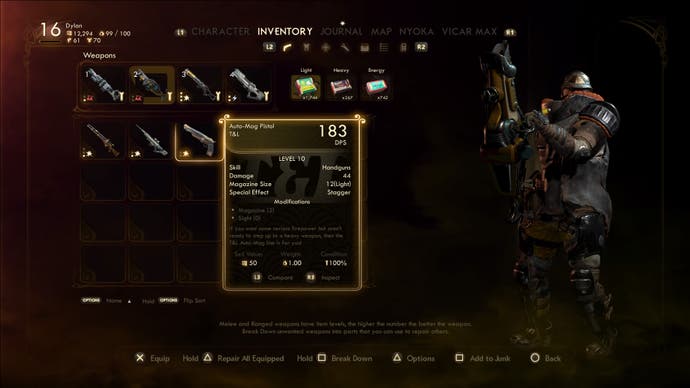
They have many lines of incidental dialogue, and offer different perspectives on key plot points. Max, the vicar, is on some level an obedient corporate stooge, while Ella, your medic, balances a brash exterior against a privileged upbringing. But they're oddly devoid of striking qualities once you get to know them, and I was never that interested in hearing their thoughts. Optional loyalty questlines aside, each character has their own potted skilltree and a secondary ability, which is rarely more complicated than dealing a big wodge of damage in one go.
As the hours roll on, the objectives and encounters chain together without seam. People want stuff collecting and/or fixing and/or other people killing. The details vary - sometimes your employer is a wizened bounty-hunter whose friends are all dead, and sometimes it's a black market kingpin. Sometimes you're fetching ink for a printing press, and sometimes you're retrieving the targeting module from a crash-landed cruiser. Either way, it's the same waypoint, the same dependable buffet of sneaking, hacking, shooting or talking things through, and the same, slavish anti-climax of combing bins and corpses for goodies. You stop paying attention to concluding binary choices because it feels like there's very little, really, at stake, beyond some percentage points on the faction loyalty screen.
I don't hate The Outer Worlds. Rather, what I hate about it is that it's sufficiently unhateful that you can spend 30 hours playing it without noticing. It's solidly-made enough that you keep hanging around in the hope of something more, like a layer of catchy percussion that never quite escalates into a song. I guess to sum things up, I would like two features to be added to the game. One is a powerful suction cannon with infinite extra-dimensional storage, so I can just gather all the loot in one fell swoop. The other is the option to hand off dialogue decisions to one of my companions, because I have no strong feelings either way, comrades. Let me do clean-up in the background, hosing down the level's crevices with one earbud in, following the conversation absent-mindedly. According to my own character's backstory as a janitor, that's exactly the part I was born to play.
